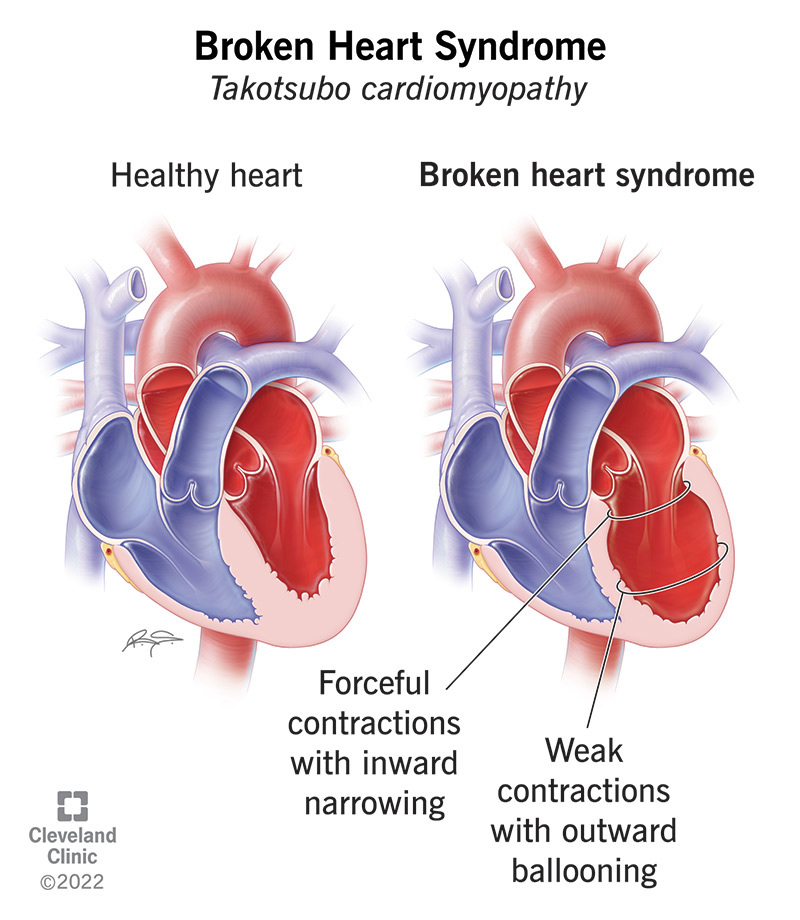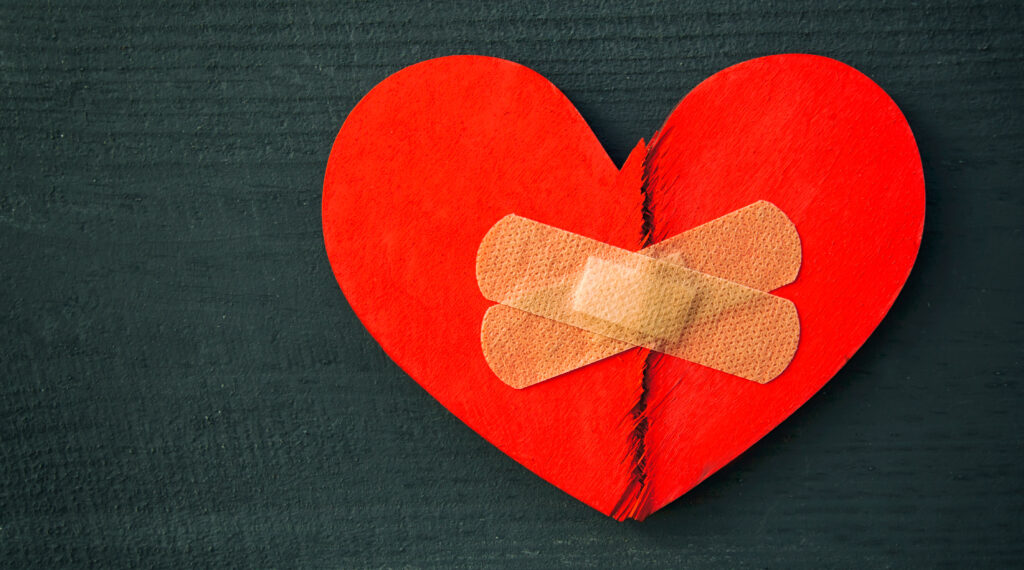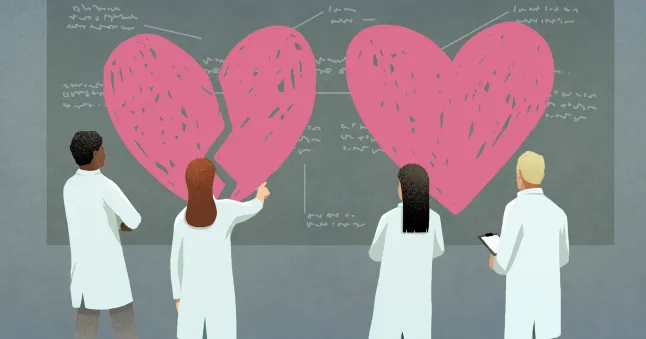Heartbreak isn’t just a figure of speech—it has real, tangible effects on the body, particularly on the heart. As Valentine’s Day approaches, many people are reminded of love and companionship, but for those going through heartbreak, it can be an emotionally and physically taxing time. Whether it’s a romantic breakup, loss of a loved one, or deep disappointment, heartbreak can significantly impact health.
In this article, we’ll explore the physical implications of emotional heartbreak, why it happens, and what you can do to protect your health and heal effectively.
The Science of Heartbreak: Why It Hurts So Much

Heartbreak activates the same brain pathways as physical pain. Studies using functional MRI scans show that rejection and emotional pain stimulate the same brain regions involved in physical injury. Neuroscientists have found that emotional pain activates the same areas in the brain as physical pain, particularly the anterior cingulate cortex and the insular cortex. This is why rejection or loss can feel as physically painful as an injury. This is why people often describe heartbreak as feeling like they’ve been “punched in the chest” or “hit by a truck.”
Additionally, heartbreak triggers the body’s stress response system, leading to a surge of cortisol and adrenaline. These hormones are designed to help us respond to immediate danger, but when released in excess due to prolonged emotional distress, they can have harmful effects such as:
- Increased heart rate and blood pressure
- Constriction of blood vessels
- Inflammation throughout the body
- Suppression of the immune system
One of the most serious physical manifestations of heartbreak is Takotsubo Cardiomyopathy, also known as Broken Heart Syndrome. This temporary heart condition mimics a heart attack, causing chest pain, shortness of breath, and even heart failure in extreme cases. It is most commonly triggered by extreme emotional stress, such as a breakup, death of a loved one, or other significant life changes.

The Physical Toll of Emotional Heartbreak
Emotional heartbreak doesn’t just weigh on the heart—it affects the entire body. Some of the physical symptoms that may arise include:
- Chest pain & rapid heartbeat – Stress-induced palpitations can make you feel like your heart is pounding out of your chest.
- Digestive issues – The gut-brain connection means stress can cause nausea, loss of appetite, or stomach cramps.
- Weakened immune system – People experiencing heartbreak are more susceptible to infections and illnesses.
- Fatigue & sleep disturbances – The stress response can make it difficult to fall or stay asleep, leading to exhaustion.
- Weight fluctuations – Some people lose weight due to appetite loss, while others gain weight due to emotional eating.
- Headaches & body aches – Muscle tension from stress can result in headaches and general body soreness.
What Can You Do to Minimize the Harm of Heartbreak?

While heartbreak is painful, there are proactive steps you can take to minimize its physical toll and aid in healing.
Manage Stress and Cortisol Levels
Since heartbreak floods the body with stress hormones, it’s essential to engage in activities that regulate cortisol levels:
- Exercise regularly – Activities like walking, yoga, and jogging help reduce cortisol and boost mood-enhancing endorphins.
- Practice mindfulness & meditation – Deep breathing, meditation, and guided relaxation can help calm an overactive nervous system.
- Laugh and engage in joyful activities – Laughter lowers stress hormones and promotes emotional resilience.
Prioritize Cardiovascular Health
Protecting your heart physically is just as important as healing emotionally:
- Eat heart-friendly foods – Include omega-3 fatty acids, antioxidants, and lean proteins in your diet.
- Stay hydrated and avoid excessive alcohol – Alcohol can amplify sadness and stress.
- Monitor blood pressure and heart health – If you experience prolonged symptoms like chest pain, consult a doctor.
Foster Social Connections
Social isolation can worsen the effects of heartbreak. Surround yourself with loved ones who provide emotional support and positive energy:
- Reach out to friends & family – Talking about your feelings can provide comfort and reassurance.
- Join support groups – Connecting with others who have experienced heartbreak can be therapeutic.
Get Quality Sleep
Rest is crucial for emotional healing and stress management. Improve sleep by:
- Establishing a bedtime routine
- Avoiding screens an hour before bed
- Using relaxation techniques like guided meditation
Engage in Positive Distractions
Redirecting your focus can help prevent dwelling on emotional pain:
- Take up a new hobby or revisit an old passion
- Travel or explore new places for a change of scenery
- Engage in self-care rituals like massages, spa days, or reading
Talk to a Therapist
- Seek professional guidance – A therapist can help you identify coping strategies tailored to your needs.
- Develop emotional tools – Therapy provides structured exercises to help you process emotions constructively.
- Prevent destructive thought patterns – Speaking with a professional can keep you from ruminating in a way that worsens distress.
- Work through your feelings – Therapy creates a safe space for self-reflection and emotional healing.
Avoid Harmful Coping Mechanisms
While it’s tempting to numb pain, some coping mechanisms can worsen physical and emotional health:
- Avoid excessive alcohol or substance use – These can lead to dependency and worsen emotional distress.
- Be mindful of emotional eating – Opt for nutritious, balanced meals rather than comfort eating.
- Don’t rush into rebound relationships – Take time to heal and reflect before seeking new romantic connections.
Embracing Healing and Moving Forward
Heartbreak is painful, but it can also be an opportunity for growth, self-discovery, and transformation. Instead of viewing it as something that breaks you, see it as an experience that builds resilience, self-awareness, and deeper emotional intelligence.

Reflection & Self-Growth
- Ask yourself what lessons you’ve learned. Every heartbreak teaches something about yourself, your values, and your needs in a relationship.
- Rediscover who you are. Without a relationship defining you, take time to explore what makes you happy and fulfilled.
- Set future relationship standards. Clarify the qualities you want in a future partner and the non-negotiables that align with your values.
Valentine’s Day as a Celebration of Love – Including Self-Love
Instead of dreading Valentine’s Day, reclaim it as a day to celebrate all forms of love—including self-love. Whether that means pampering yourself, spending time with friends, or reflecting on personal growth, make the day about honoring yourself.
Heartbreak hurts, but understanding the science behind it and actively taking care of your physical and emotional well-being can help you emerge stronger, healthier, and ready for new beginnings.

